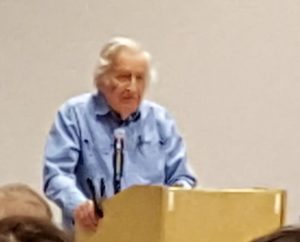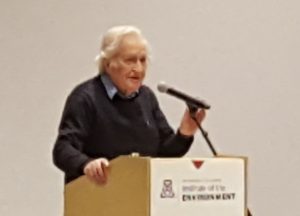 When I learned that world-famous linguist and political commentator Noam Chomsky would teach a class at the University of Arizona, I signed up. A lot of people from the northeast come to Tucson for the winter, but most of them don’t come directly from MIT to teach a university course. Whatever his reasons, I was glad to take advantage.
When I learned that world-famous linguist and political commentator Noam Chomsky would teach a class at the University of Arizona, I signed up. A lot of people from the northeast come to Tucson for the winter, but most of them don’t come directly from MIT to teach a university course. Whatever his reasons, I was glad to take advantage.
The course was a series of 16 hour-long lectures making up a critique of capitalism. Chomsky, who is 88, read prepared lectures from a script. Though he was well-amplified and easy to hear in the large auditorium, his voice was frail and monotone. He never looked up from his notes. He used no visual aids. He just stood at the podium and recited.
The lectures were the epitome of the dry-as-dust stereotype of a droning professor. Older students like me hung on every word, knowing that this is The Man and he knows whereof he speaks. It’s Noam Frigging Chomsky! But I imagine the 18 to 21-year-old matriculated crowd were thinking, “Oh, God. How many minutes left to go?”
The 150-level course was entitled “What is Politics?” though that question was hardly addressed. According to the syllabus, “… politics is about who gets what, when and how, [and] where.” That defines politics exclusively as economics. I think most political scientists would prefer a more comprehensive definition, one, for example that also encompassed issues of group identity and values, pursuit of common goals, the structure of government, a forum for conversations, the exercise of power, and many other aspects. Okay, I’d go with a narrow definition of politics just for the sake of the course. But then it turned out that the course wasn’t even about that.
Buried further in the text, the syllabus also said that “…the course will examine how industrial state capitalism has come to dominate our thinking as the only way to organize the political economy to satisfy human needs and wants.” This was what the course was mainly about. It was a critique of late-stage capitalism and how we are “brainwashed” into accepting it without question.
On Tuesdays, the lecture was delivered by Marvin Waterstone, a U of A professor of Geography, and on Thursdays, lectures by Chomsky were followed by a question-and-answer session where a selected U of A faculty member would toss fluffball questions to Chomsky so he could expostulate off script for a few minutes. Those were actually the most interesting part of the course.
Waterstone, whose qualifications for co-leading the course were never revealed, filled his hour by summarizing the assigned readings for the week, often by reciting long passages from them verbatim and reducing others to PowerPoint bullet lists. Apparently, students these days don’t or can’t read the assignments. I cannot imagine what benefit accrues from having someone read to you papers that you already read for yourself. It wasn’t as if he added context, historical perspective, contrasting ideas, examples, or linkages. None of that. He simply synopsized the readings.
How such a travesty passes for higher education was a mystery to me and my heart went out to the young students. It was a perfect example of what I have long suspected, that the purpose of education is to pound the creativity out of you so you will never again have an original thought. (As an ex-college professor, I flatter myself in believing that I worked against type).
At least Chomsky had things to say. I would rather he’d talked about linguistics, the field in which he made his name in the 1950’s by discovering (or inventing, depending on who you talk to) the generative grammar, the deep structure of language, the language acquisition device, and many other innovations. But he left all that behind long ago, and since the 1960’s has been a tireless critic of government, politics, and capitalism in the U.S. He was a prominent voice in the anti-Vietnam war movement and a scathing critic of the Bush wars on Iraq and Afghanistan.
 So what is his grievance? He believes, with good reason, that capitalism inevitably leads to exploitation of workers and ultimately to government plutocracy, rule by the rich, a situation we have arrived at in America. He has deep roots in Marxism, but he’s not “a Marxist,” if there are even any of those left. That set of ideas has its own internal contradictions, such as the labor theory of value, a foundational idea based entirely on a semantic ambiguity. But we did read excerpts from Marx, Gramsci, and others. About half the assigned readings were quite valuable.
So what is his grievance? He believes, with good reason, that capitalism inevitably leads to exploitation of workers and ultimately to government plutocracy, rule by the rich, a situation we have arrived at in America. He has deep roots in Marxism, but he’s not “a Marxist,” if there are even any of those left. That set of ideas has its own internal contradictions, such as the labor theory of value, a foundational idea based entirely on a semantic ambiguity. But we did read excerpts from Marx, Gramsci, and others. About half the assigned readings were quite valuable.
Chomsky’s preferred political alternative is “anarcho-syndicalism,” a mouthful, to be sure, which I had to look up. He mentioned the idea but did not press it in class. The goal of the course was to critique capitalist-based government in the U.S., without really articulating an alternative. He suggested that students should to “take to the streets” and “resist the lies” and “reject the common-sense assumptions,” and in general, return to the activist years of the 1960’s and 1970’s. Maybe this time wearing pussy hats? I don’t know, he wasn’t clear on what we should be protesting. He didn’t provide any clear agenda.
In the 1970’s we had the draft and that was personal and that was the basis for the street protests. We said, “You politicians can lie, cheat, and steal as long as you do it quietly, but when you require me to stand up and take a bullet for you, I draw the line.” We have not yet come to that breaking point again in today’s politics.
So despite Chomsky’s longstanding participation in government criticism, he did seem stuck in time. He could, and did, talk in detail about a CIA-sponsored overthrow of a government in Guatemala a half-century ago, with names, dates, and incidents. But he said not one peep about Donald Trump and his administration, nor did he have anything to say about any American president or administration since Eisenhower. My impression was that while Chomsky is extremely sincere, expert, and articulate about his displeasure with government power, he’s already a historical figure himself.
Another serious problem with the course was its tone, which was toxically cynical. For example, the so-called “War on Drugs” has been, contrary to popular opinion, completely successful. Did you know that? Why? Because its purpose always was to sweep into prison non-economically productive members of society, get them off the streets and reduce the numbers of the poor that we have to care for with social programs. Under that goal, the “War” has succeeded.
Not only is that view unsupported by historical facts or population statistics, it is deeply cynical in attributing the darkest, vilest motives to the government. Other people’s motives cannot be ascertained, only inferred, so it is gratuitous at least, and mean-spirited at worst, to attribute such motives, especially in the absence of evidence. Not to mention that the cost of incarceration is far higher than any cost of social programs for the poor. I agree that the “War on Drugs” was, and still is, a bad idea, but I don’t jump to the conclusion that it arose as a malevolent conspiracy.
This was a problem throughout the course. The darkest, most evil motives were asserted for anyone who disagreed with Chomsky’s agenda. In his lectures and throughout most of the readings, arguments were consistently one-sided, evidential quotations selective and secondarily sourced, propositions laden with innuendo and presumptive values, assertions with willfully conflated correlation and causation, and so on. All these transparently propagandistic rhetorical techniques were an affront to critical thinking and undermined the credibility of the course’s goals. After the first few lectures, I stopped taking any of Chomsky’s arguments seriously. At first I did some online research and discovered how extremely biased and one-sided his lectures were, then I lost interest. What a wasted opportunity.
But it was worse than merely a wasted opportunity. I was angry and disappointed that this sort of crass propaganda passes for higher education. I felt very sorry, indeed for the youngsters in the class who, presumably, were not as able as I to see through the rhetorical fog the course was blowing.
My only consolation was that basically, I agree with the course’s premises: capitalism does lead to a deceptive and pernicious plutocracy. So maybe it isn’t so terrible if students come to believe that. But that point of view should come after information-gathering and critical thinking, not from having it forced down your throat by a couple of arrogant and disrespectful propagandists who hold academic power over you. These professors acted out the same abuses of power and truth that they accused the government of, but they were immune to the irony.
I’m glad I took the course. It sharpened my awareness of how greed trumps all, works against even the very survival of the planet. I guess it also made me feel more helpless than I did before. If I were much younger, maybe I’d do something about it. Take a law degree and go into politics perhaps, I don’t know. In the present reality, I can only wallow in despair. I don’t have much hope for the youth, if this is the quality of education they’re getting.
